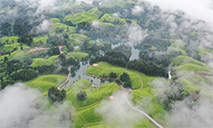People from “cliff village” in SW China’s Sichuan enjoy better lives

① Villagers of Atulie’er village, which is situated on a cliff in Zhaojue county, Liangshan Yi Autonomous Prefecture of southwest China’s Sichuan Province, pose for photos during an event marking the 70th anniversary of the founding of the People’s Republic of China on the handrail-equipped steel ladder in September 2019. (Photo/Ake Jiushe)
② Photo shows the clean and tidy Mu’endi community in Zhaojue county, Liangshan Yi Autonomous Prefecture, southwest China’s Sichuan Province. (Photo/Ake Jiushe)
③ Photo shows a rattan ladder on a cliff in Atulie’er village, Zhaojue county, Liangshan Yi Autonomous Prefecture, southwest China’s Sichuan Province. (Photo/Ake Jiushe)
Residents of a village situated on a cliff in southwest China’s Sichuan Province are now living a better life, thanks to local efforts in relocating impoverished villagers from inhospitable areas, improving traffic facilities, and developing industries such as embroidery, tourism, and crop planting
“Recently, the village upgraded a road built for the development of tourism and built a waterworks. The village is also formulating a plan to develop local tourism,” said Pacha Youge, mayor of Guli township of Zhaojue county, Liangshan Yi Autonomous Prefecture, adding that villagers firmly believe that better days are yet to come.
Atulie'er village in Guli township is nicknamed the “cliff village,” where a zigzag rattan ladder once provided the only link to the outside world. In 2016, the village began to build a handrail-equipped steel ladder with government funding, making the road up and down the mountain much easier.
In May 2020, 84 registered poor households from the “cliff village” moved to new houses at poverty-relief resettlement sites with sound public services facilities, including kindergartens, schools, and hospitals, in the county seat of Zhaojue.
Ahuo Aguo, a villager from the “cliff village,” and members of her family now live at a resettlement site in Nanping community. “Our new home is 100 square meters, much larger than our old house in the village. It is clean and tidy, and we like it very much,” she said, adding that a kindergarten is within walking distance. Meanwhile, she works as a cleaner in her community.
Ahuo Aguo, who once worked at a garment factory, also makes embroidery works during her spare time and sells some of them for extra income.
Aguo’s husband, Mou’se Labo, is an internet celebrity because of his videos promoting the village. Now he works as a guide for a tourism company in the village and continues to promote the village to the outside world through live-streaming sessions, earning about 4,000 yuan (about $605.4) per month. He usually stays in the village for about 24 days each month, and spends the rest of the month in his new house in the county seat.
New houses at the resettlement sites are spacious and bright and boast a complete set of utilities including water, power and gas supply, Mou’se Labo pointed out, adding that people can also work in factories near the resettlement sites.
Mou’se Erbu, another villager from the “cliff village,” moved to his new house at a resettlement site in Mu’endi community in the county seat. The 42-year-old said the resettlement site is equipped with a kindergarten, and there are primary and middle schools nearby.
Mou’se Erbu, who once worked as s a migrant worker, started to learn how to plant navel oranges from agricultural technicians in March 2016. He sold his family’s navel oranges worth more than 10,000 yuan in 2018 and over 50,000 yuan last year. Like Mou’se Erbu, over 20 households in the village now plant navel oranges.
Pacha Youge, who was the first secretary in charge of poverty alleviation in the “cliff village,” introduced that the village has developed navel orange and olive planting, as well as chicken and sheep breeding industries.
Villagers can earn income by transferring the use right of their land to a company for growing olives and by working for the company, which also distributes dividends to them, the official said, noting that the village has planted olives on over 200 mu (13.33 hectares) of land.
Shiyi Axi, secretary of the Party branch of Mu’endi community, pointed out that the community has been committed to helping relocated villagers from the “cliff village” find jobs and embrace a new life.
According to the official, the community has organized vocational courses for relocated villagers. Last year, six sessions of vocational courses covering electrical work, welding and cooking skills, housekeeping and embroidery of the Yi ethnic group were organized.
“The ‘cliff village’ will continue to develop its collective economy to make the village more beautiful and bring better lives to villagers,” Pacha Youge said.
Photos
Related Stories
- Digitalization boosts rural vitalization in SW China’s Guizhou
- E-commerce, intangible cultural heritage inject impetus into rural vitalization in China
- Integration of culture, tourism gives impetus to China’s rural vitalization
- Village in central China’s Henan develops fried dough twist industry, boosts rural vitalization
- Traditional handcrafts give impetus to China’s rural vitalization
- Photographer documents remarkable transformation of village in SW China’s Guizhou over course of more than two decades
- “They have embraced a new life through hard work”: Retired Luxembourg police officer in Guangxi
- County in China’s Yunnan establishes rural talent pool of skilled farmers in push for common prosperity
- County in SE China's Fujian restores ancient residential complexes in pursuit of rural vitalization
- “Science and technology backyards” help drive talent development in China’s rural areas
Copyright © 2022 People's Daily Online. All Rights Reserved.










